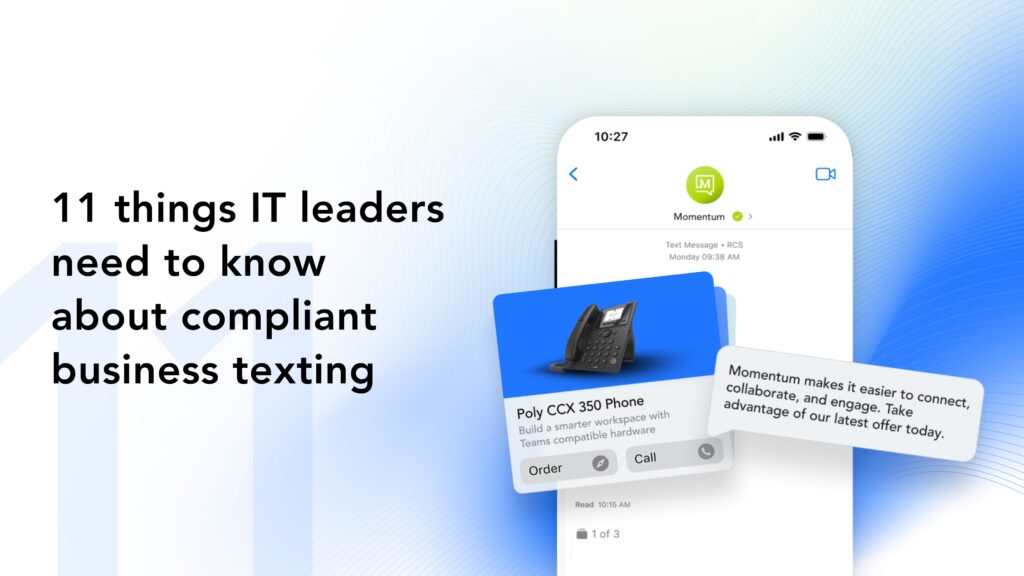The workplace as we know it continues to change almost daily.
We’ve seen the rise of remote and hybrid work, global teams, and the need for easy collaboration in any environment. In fact, in 2024, 28.2% of full-time employees claimed they worked in a hybrid model.
Adapting to these trends has created new challenges like:
Maintaining a connected company culture
Streamlining communications between your teams
Ensuring full employee visibility and collaboration in hybrid work environments
Getting all of this right requires the right unified communications solution — a platform that your people can use to create, connect, and collaborate in this evolving workplace.
It’s no secret companies in all industries are migrating to unified communications providers to streamline workplace communications to reduce costs, improve service reliability, and overcome scaling issues.

Still, one question remains: what should you look for in a unified communications provider?
We’ve put together 7 questions to ask before choosing a service provider, so you can make the right decision for your next Unified Communications as a Service (UCaaS) solution.
Start by evaluating your business needs
When selecting a managed service provider, it’s essential to evaluate your business needs to ensure you find the right provider for your organization.
Here are a few things to consider:
What are your business goals, and how can a managed service provider help you achieve them?
What are your current IT challenges, and how can a managed service provider address them?
What are your future plans for growth and expansion, and how can a managed service provider support you?
What are your budget constraints, and what are your expectations for pricing and contract terms?
How do your teams collaborate?
Which features are must-haves, and which ones are nice-to-haves?
By evaluating your business needs, you can create a clear picture of what you’re looking for in a managed service provider and make an informed decision.
Next, onto the critical questions you need to ask to find the perfect UCaaS provider.
#1: Do You Offer Tech Support Through the Migration Process?
Implementing a new UCaaS solution isn’t as simple as flipping a switch and using your new solution. A reliable support team is crucial to ensure a smooth transition. That’s why it’s important to look for a provider that can support you through the transition — one that has a clear process in place.
Moving to a UCaaS provider takes time. You want your provider to assist you with the data gathering process by providing you with a list detailing what information is essential for a smooth transition. After all, adopting new phone systems and applications require training and support.
If you’re planning to choose Microsoft Teams, take the time to understand the different voice options available to you, and what you will need to do to enable them. As Microsoft Teams enablement specialists, we can help you pick the best option for your business.
If you’re looking at other solutions on the market, you may need specialized integrations if you want to add dial capabilities to the platform.
So, what questions should you ask during this process?
What does the prospective UCaaS provider offer to assist your company during this migration?
Are any solutions provided, or are you on your own to migrate over to their services?
Is your IT department equipped to migrate to a UCaaS provider?
#2: What solutions do you provide beyond VoIP?
It’s a given that a UCaaS provider is going to offer VoIP, but what other solutions are included in the “unified” aspect of their services?
An ideal provider will offer the following UCaaS solutions:
High-quality audio and video conferencing
Collaboration features like file sharing, screen sharing, and messaging
A seamless, multi-device experience
Business phone functionality
Different service levels can provide tailored support options to meet diverse customer needs.
If your organization is moving to a UCaaS provider, you deserve more than just VoIP. Your organization should be given all the tools it needs to communicate and collaborate effectively.
This is one of the biggest advantages of Microsoft Teams and other all-in-one UC platforms. These platforms can easily support a fully integrated business phone system.
The hybrid workplace requires truly unified communications, which means your employees need to be empowered to communicate synchronously or asynchronously, depending on the needs of their roles. If a UCaaS provider is not making all of the above possible, they may not be right for your company.
#3: Do you have enterprise-grade services?
There are plenty of companies out there claiming to have enterprise-grade services. However, many of them are unable to keep up with the demands of enterprise customers.
In order to discover which potential providers are capable of handling heavy traffic loads, ask how much control they have over security, scalability, and quality.
Many providers are rapidly implementing new SD-WAN solutions to provide better bandwidth management and visibility. Momentum can provide your IT manager with a portal that allows them to see all users on a network, prioritize bandwidth to the various apps you use, and manage bandwidth across the services on that network.

The more control a provider has over the network that delivers their services, the better. An ideal provider will have enough control of the infrastructure that they’ll be able to prioritize calls and other delay-sensitive types of communication over less vital data.
All of these factors combined work to enhance security and reduce your IT spend.
#4: Where are your facilities physically located?
A UCaaS provider that’s worth your business will provide multiple points of presence (POPs), geo-redundancy, and reliable failover systems to keep your communications flowing at all times.
Doing so means that your communications services won’t be jeopardized by natural disasters and other disruptive events.
This is the same logic that’s applied to other IT services where redundancy and availability are priorities. Momentum uses three physical locations (Seattle, Dallas, and Washington, D.C.) to bolster our service redundancy.
The reality is you should look for a provider that offers both geo-redundancy and auto-failover. That way, if one area of the network goes down, it will automatically route traffic through the next best location available.
#5: Does your solution allow for any third-party integrations?
The landscape of unified communications is constantly shifting and evolving. Choosing the right MSP ensures seamless integration with your existing business applications. Businesses require their various services to work together to help carry out their tasks.
It’s important to determine if a UCaaS provider will allow integrations with other essential business applications you use.
Most UCaaS providers use integration-friendly platforms, but you should verify that the integrations you need are possible. And if they don’t offer them, are they willing to work with you to enable that integration?
Integration is a big differentiator today. It’s one of the main reasons why Microsoft Teams is such an attractive solution in the enterprise space. Being able to accomplish more within a single app’s interface boosts your team’s productivity and is an important first step towards embracing the hybrid workforce.
Additionally, ask the provider about their uptime guarantee. A network with built-in redundancy will be redundant enough to guarantee uptime over 99%.
#6: How do you handle data security?
Many organizations have some sort of regulatory body that is involved with monitoring how it handles sensitive information. Reliable tech support is essential to maintain data security and compliance.
When considering a UCaaS provider, you should consider how the data that employees transmit is secured. Does the UCaaS provider ever have access to company information? Are video conferences, voice calls, and other tools encrypted to ensure security? Are they compliant with HIPAA and other important legislation?

The answers to the above questions will help you determine if the UCaaS provider in question will keep you in compliance with regulatory bodies. Ideally, all data is encrypted, and the provider never has access to any sensitive information.
An ideal UCaaS provider never accesses company data in any way. All data should be fully encrypted between endpoints and only accessible by authorized users. There is never a reason for a UCaaS provider to monitor the content of an organization’s communications.
Scalability and flexibility
Scalability and flexibility are critical factors to consider when selecting a managed service provider. You want a provider that can grow with your business and adapt to changing needs. Consider the following:
Can the provider scale up or down to meet your changing needs?
Does the provider offer flexible pricing options, such as hourly or monthly billing?
Can the provider provide customized solutions tailored to your specific business needs?
Does the provider have a proven track record of supporting businesses of your size and industry?
By choosing a provider that offers scalability and flexibility, you can ensure that your IT needs are met as your business evolves.
#7: Do you offer specialized phone system support?
What good is a UCaaS solution if it doesn’t provide high-quality support for its phone system?
Here’s what we mean by this. You likely already know what Microsoft Teams is—it’s arguably the best UCaaS solution on the market when it comes to functionality, integrations, and supporting the full Microsoft ecosystem. Consider how many calls it takes to resolve issues with the phone system.
But specialized phone system support is one area where the company struggles because networking technology is complex. And if you’re a smaller company, receiving timely support is an even bigger challenge. Should your phone system go down, you don’t have days to wait for a response—you need immediate support.
That’s why it’s important to work with a UCaaS provider that understands complex network architecture and how phone systems work within Microsoft Teams. Working with a provider like Momentum ensures your phone system is configured to your exact needs, that you have access to high-quality and US-based support when you need it, and better prices and quality than Microsoft’s Calling Plans can offer.
Pricing and contract
Pricing and contract terms are critical considerations when selecting a managed service provider. You want to ensure that you’re getting the best value for your money and that the contract terms align with your business needs.
Consider the following:
What is the pricing structure, and are there any hidden fees?
What are the contract terms, and are there any penalties for early termination?
Are there any discounts for long-term commitments or bundled services?
Does the provider offer flexible payment options, such as monthly or quarterly billing?
By carefully evaluating the pricing and contract terms, you can ensure that you’re getting a fair deal and that the provider is committed to supporting your business needs.
Looking for a UCaaS service provider? Momentum can help
Unified communications are the catalyst of the hybrid workplace. The way we work has changed forever, meaning every workplace needs a UCaaS solution to stay connected and collaborative.
You now know which questions to ask a potential UCaaS provider, from basic functionality to platform security. Understanding a UCaaS provider’s capabilities, redundancy, and tools will help you decide if they align with your needs.
Still have questions about UCaaS? Get in touch with our team today to discover your best options for supporting effective collaboration and communications in any work environment.



